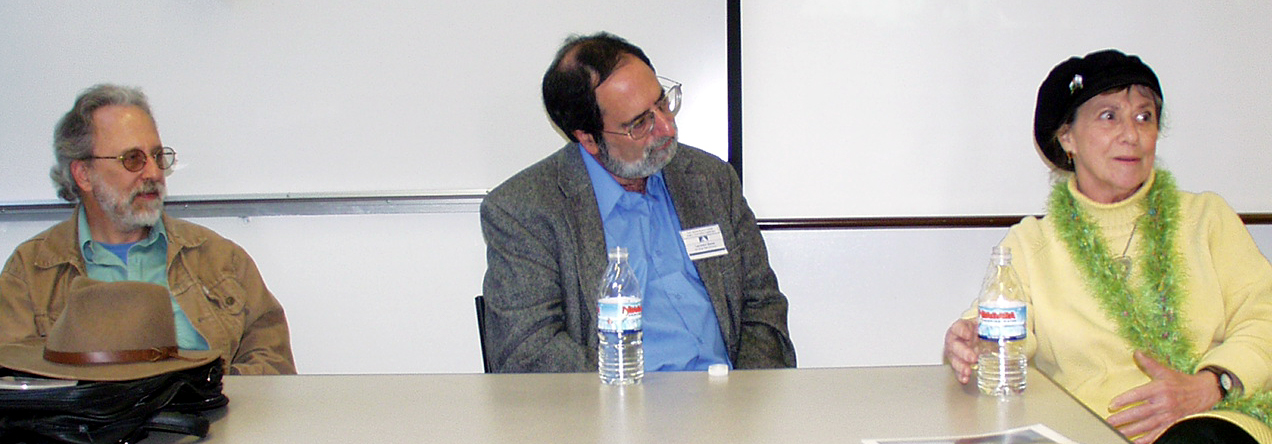|
By Donald H. Harrison
LONG BEACH, Calif.— In the wake of Palestinians turning to
Hamas for political leadership, are dialogues between Palestinians and Jews
living in the United States simply wishful thinking, or can they point a way to
a peaceful future in the Middle East?
Such was one of the questions asked by scholars at the Western Jewish Studies
Association conference here on Sunday following the showing of Talking Peace,
a documentary made last year by Mark Freeman, a San Diego State associate
professor of theatre, television and film, on the Palestinian-Jewish Dialogues
occurring in San Diego.|
No one knew the answer, of course, but the filmmaker expressed his belief
in a ripple theory of history in which if you throw a rock into a pond, it can
create ripples —the action of one can have an effect on many.
In his film, Freeman followed a group of San Diego dialoguers who included Rabbi
Moshe Levin (who now occupies a pulpit in the San Francisco Bay area); George
and Haifa Khoury, Nader and Afaf Elbanna, Jamal Kanj, Miko Peled
(son of Israeli Gen. Matti Peled), Martin Stern; hosts Doris Bittar and
Jim Rauch, a Palestinian-Jewish married couple, and others.

SDSU Faculty members Mark Freeman, Lawrence Baron and
Pat Boni
The film juxtaposes the different, yet similar "narratives" of the
Jews and the Palestinians. Stern tells how his family were refugees from
Hitler's Europe. Jamal Kanj, in counterpoint, tells of living in a
Palestinian refugee camp. Rabbi Levin tells how when he grew up he and other
Jews were told that the only reason Palestinians lived in refugee camps were
that the Arab countries refused to absorb them, whereas Israel absorbed Jewish
refugees from Arab countries. Nader Elbanna explains that when his family
left Nazareth, they did so thinking they would return after the shooting
stopped, but then the borders were closed. Now a successful American
businessman, he visited his family's home in Nazareth and was presented by his
relatives with the key to his parents' former house, a key which he keeps close
to his heart.
Elbanna also tells of serving in the Jordanian Army and experiencing a friend
dying in his arms during warfare with Israel. In counterpoint, Peled tells
of his 14-year-old niece, Smader, being killed in a suicide bombing. The
film cuts to an interview with Peled's brother in law, Rami, the father of
Smader. After the shiva, he said, he realized he had two choices,
to hate—but what good would that do, could it bring back his baby?—or to
seek reconciliation. He chose the latter, with his "mission in
life" being "to go out to tell people we are not doomed"— that
the cycle of violence between the two peoples can be changed.
Afaf Elbanna, the wife of Nader, confides that she had been raised to hate
Jews—and had not cared about their suffering—but that the stories told by
Rami and Miko touched her.
Dialogue poses the idea that if people "really listen" to each other,
and discover that underneath their political differences there are human
commonalities, that eventually friendships can form. Suspicions have to be
overcome. Elbanna's first reaction to seeing Peled was that the general's son
surely was an agent of the Mosad, but he later revised his opinion after seeing
the young man wearing dual Israeli-Palestinian flags on his lapel.
Bittar, an artist who has exhibited a series of her portraits of Palestinians
and Jews—coupled with each subject's personal narrative—says the dialogue
has made her less dogmatic about what the solution in the Palestinian-Israeli
conflict should be. "I think all the Palestinians involved in
dialogue have changed," she says. Levin comes to a similar conclusion
about Jews: that people don't want to live out their lives in anger, resentment
and violence.
Freeman was joined on a panel following the screening of his film at the
conference by San Diego State University colleagues Prof. Lawrence Baron,
director of the Jewish Studies Program, and Pat Boni, a lecturer in
religious studies who, among other interests, is active in "Progressive
Grandmothers for Political Action."
Boni said one of the most difficult corners to turn in such dialogues is to get
people to stop talking about what happened in the past and to start talking
about possible solutions. Freeman described dialoguing as an "organic
process, with bottom up organization, that ebbs and flows according to the
individuals." Baron noted that such efforts do not occur in a vacuum, that
at San Diego State, the Judaic Studies Department brings an Israeli professor
each year to teach on campus and that the Israeli may come from anywhere on the
political spectrum. He also recalled that the college in the past was the
venue for quiet meetings among Israeli and Arab agricultural experts, with some
of the Arabs coming from countries without formal relations with Israel.
There have been moments of epiphany during the dialogues, Boni
said. She told of a Syrian-born man who attended a dinner among dialoguers
and said that he had been taught to hate Jews since he was a child.
"I was wrong," he confessed, with tears in his eyes.
Such a man stands in contrast to "extremists on both sides" who look
at dialoguers as "sell outs and traitors," Freeman said.
More information about the dialogues, or about obtaining a copy of the film for
discussion purposes, may be found on Freeman's
website.
|

